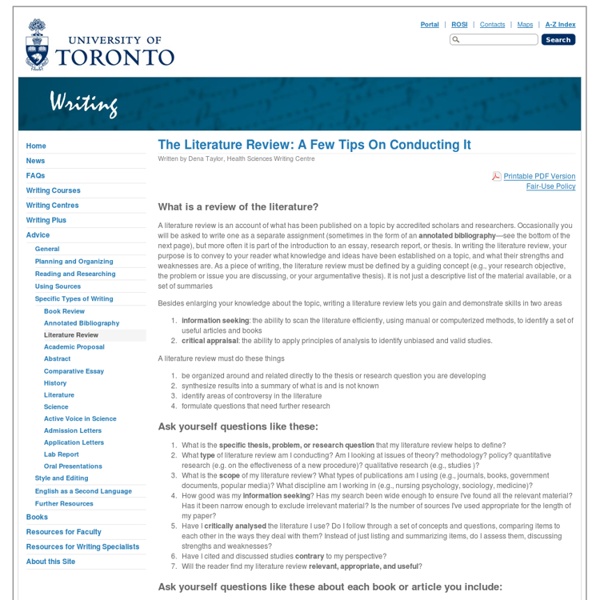Write a Literature Review | University Library
1. Introduction Not to be confused with a book review, a literature review surveys scholarly articles, books and other sources (e.g. dissertations, conference proceedings) relevant to a particular issue, area of research, or theory, providing a description, summary, and critical evaluation of each work. The purpose is to offer an overview of significant literature published on a topic. 2. Similar to primary research, development of the literature review requires four stages: Problem formulation—which topic or field is being examined and what are its component issues? Literature reviews should comprise the following elements: In assessing each piece, consideration should be given to: Provenance—What are the author's credentials? A literature review may constitute an essential chapter of a thesis or dissertation, or may be a self-contained review of writings on a subject. The literature review itself, however, does not present new primary scholarship.
What Is Differentiated Instruction?
Click the "References" link above to hide these references. Csikszentmihalyi, M. (1997). Finding Flow: The Psychology of Engagement with Everyday Life. New York: Basic Books. Danielson, C. (1996). Enhancing Professional Practice: A Framework for Teaching. Sternberg, R. Tomlinson, C. (1995). Tomlinson, C. (1999). Vygotsky, L. (1986). Winebrenner, S. (1992).
Doing Successful Literature Reviews
Searching for research literature efficiently, finding what you need quickly, finding the full text online when available, and avoiding an avalanche of irrelevant references. Hint: Your favorite search engine will not find most of the scholarly literature! Note: As of 2005, most of the general guidance in this section on searching is still useful, but the specifics about various search tools are obsolete. Assessing individual reports of research literature to determine whether their findings and conclusions should be relied upon or are likely to be misleading. Hint: Some of the research literature on almost every topic is misleading or trivial. Integrating the various studies on a topic to make the best assessments of what is known about the topic, to identify promising future research, to improve conceptual frameworks for research, and to determine the advantages and disadvantages of previously used methodologies. How This Webtorial Will Help You Searching for Research Literature
Cooperative Grouping | Researched-Based Strategies
Related Classroom Examples Guiding Cooperation Teacher turns to technology to guide cooperative learning in a blended fourth-fifth science class. Collaborative Writing Middle school students polish skills for writing, reflection, and collaboration. Cooperative Grouping Cooperative learning is actually a generic term that refers to numerous methods for grouping students. Students understand that their membership in a learning group means that they either succeed or fail—together. Key Research Findings Organizing students in heterogeneous cooperative learning groups at least once a week has a significant effect on learning (Marzano, Pickering, & Pollock, 2001). Implementation Grouping students to work collaboratively and cooperatively offers benefits for learners. Create the right type of group for the need. Additional Resources
Doing a Literature Review: Releasing the Social Science Research Imagination Published in association with The Open University: Amazon.co.uk: Dr Christopher Hart
Flip to back Flip to front Listen Playing... Paused You're listening to a sample of the Audible audio edition. Learn more Go <div><p>'This book can provide an excellent framework for bolstering what is often an experiential process - doing a literature review. £19.70 FREE Delivery in the UK. Frequently Bought Together No Kindle device required. Apple Android Windows Phone To get the free app, enter your e-mail address or mobile phone number. or What Other Items Do Customers Buy After Viewing This Item? Look for similar items by category
PCM Support Materials
Parallel Curriculum Model (PCM) Support Materials and Distance Learning Opportunity The National Association for Gifted Children is pleased to offer support materials for the Parallel Curriculum Model (PCM). It is our hope that these support materials will provide interested educators with an opportunity to participate in a distance learning initiative about the PCM. What is the PCM? The Parallel Curriculum Model is an integrated framework and set of procedures for designing rigorous and highly motivating curriculum that attends to important student differences. About these support materials This web page is a collaborative effort between the National Association for Gifted Children and Project CONN-CEPT, a Javits Grant awarded to the Connecticut State Department of Education and Cheshire (CT) Public Schools. Looking for more information about PCM? Check out the following NAGC Service Publications:
Easy Steps to doing a Literature Review & Critiquing Qualitative and Quantitative Research « Lancashire Care Library and Information Service
Posted on March 19, 2008 by lancashirecarelibraryblog Step by Step Guides to Critiquing Qualitative and Quantitative Research step-by-step-guide to critiquing research part 2 qualitative research step-by-step-guide to critiquing research part 1 quantitative research 2008-undertaking-a-literature-review-a-step-by-step-approach.pdf Click for full-text Never done a literature review, have done and not quite sure if you have done it correctly, take a look at this user friendly guide to doing a literature review from The British Journal of Nursing (2008) Abstract: Nowadays, most nurses, pre- and post-qualification, will be required to undertake a literature review at some point, either as part of a course of study, as a key step in the research process, or as part of clinical practice development or policy. Like this: Like Loading... Filed under: literature searching, Study Guides Tagged: | doctors, information literacy, literature searching, nurses, research, study, Study Guides, training



